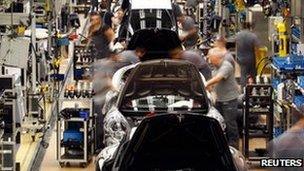Eurozone avoids recession after strong German growth
- Published

German industry is the powerhouse of the eurozone economy
The eurozone has narrowly avoided returning to recession after recording zero growth in the first three months of the year, figures have shown.
The stronger-than-expected performance was in large part due to growth of 0.5% in the German economy.
In the final quarter of 2011, the eurozone shrank by 0.3%, and many analysts expected further contraction.
The French economy recorded zero growth in the first quarter of 2012, while the Italian economy contracted by 0.8%.
The Italian economy shrank by 0.7% between October and December last year, and it has now contracted for three consecutive quarters. The country is struggling as the government cuts back on spending, raises taxes and reforms pensions in an attempt to cut debt levels.
<link> <caption>The figures from Eurostat</caption> <url href="http://epp.eurostat.ec.europa.eu/cache/ITY_PUBLIC/2-15052012-AP/EN/2-15052012-AP-EN.PDF" platform="highweb"/> </link> also showed that Spain's economy shrank by 0.3% in the first quarter.
Separately, the Greek national statistics office said the nation's economy had contracted by 6.2% in the three-month period. Greece is implementing drastic austerity measures to cut its deficit and comply with the terms of a massive bailout from the European Union and the International Monetary Fund.
These measures have proved hugely unpopular with Greeks, the majority of whom voted against austerity in elections earlier this month. On Tuesday, politicians admitted defeat in their attempts to form a working coalition, meaning Greece will go the polls again next month.
News of the breakdown in talks pushed Greek stocks down almost 6%, which in turn dragged major European exchanges lower. However, investors soon recovered some composure, with the Athens exchange down about 3.5% and the main London, Paris and Frankfurt indexes about 0.5% lower by mid-afternoon trading.
'Weak consumption'
The German statistics agency, Destatis, said the country's economic growth was due to a rise in exports and higher domestic consumption.
The return to growth means Germany has avoided a so-called double-dip recession, confounding the predictions of a number of commentators.
"This is a very strong comeback. The decline in the fourth quarter was not the start of a recession but just an economic dip," said Joerg Kraemer at Commerzbank.
"Germany is faring better than the rest of the eurozone. But I do not believe that it will continue at this speed."
In contrast, the French growth figures failed to outperform analysts' expectations, and the growth figure for the final quarter of last year was revised down to 0.1% from 0.2%.
"There was no good surprise," said Philippe Waechter at Natixis Asset Management. "There was weak consumption [and] no investment."
Some analysts believe that the first quarter may prove something of a temporary respite as many eurozone economies continue to struggle amid weak demand, high unemployment and dramatic cutbacks in government spending.
"Looking ahead, the situation will only get worse as the periphery remains mired in recession and German exports falter," said Capital Economics.
"Indeed, eurozone business surveys like the composite Purchasing Managers Index (PMI) already point to a contraction of about 0.3% in the second quarter."
The closely-watched PMI survey published earlier this month showed one of the steepest monthly contractions in the eurozone's private sector for almost three years.
A survey of German investors published on Tuesday also suggested confidence was weakening, with the Zew poll of economic sentiment dropping to 10.8 in May from 23.4 in April.
Case for growth
The French growth figures came on the day of the inauguration of the new French President Francois Hollande, who has vowed to boost economic growth.
In the run up to the presidential election, in which he ousted Nicolas Sarkozy, he campaigned hard for measures focusing on stimulating the economy alongside the austerity measures that have been adopted across the eurozone.
He will speak personally to German Chancellor Angela Merkel in Berlin later on Tuesday to make the case for growth.
Mr Hollande believes that growth rather than austerity is the best way for governments to reduce their debts, a view that is being discussed more widely as the eurozone economy continues to struggle and increasing numbers of Europeans voice their anger at austerity.